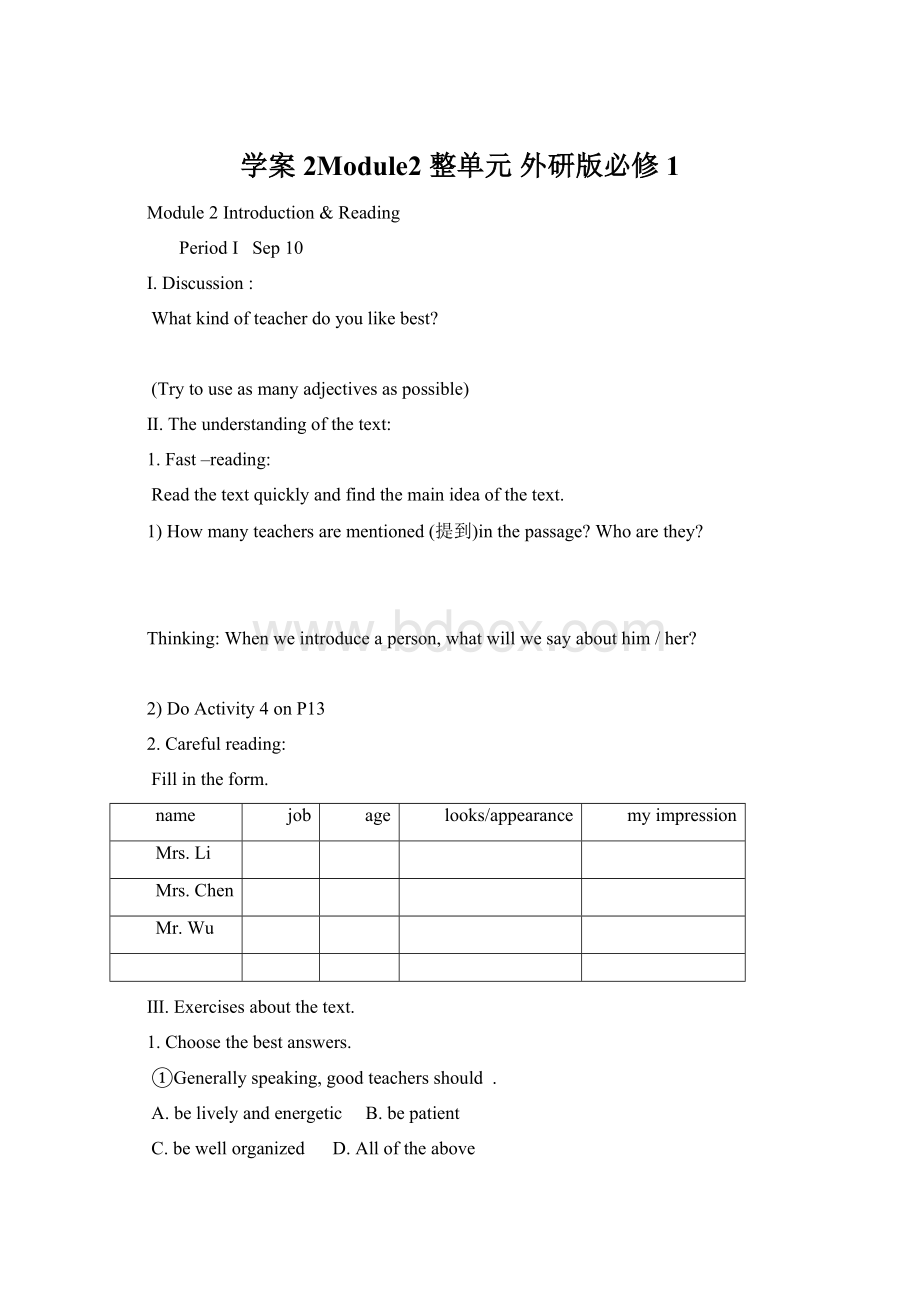学案2Module2 整单元 外研版必修1.docx
《学案2Module2 整单元 外研版必修1.docx》由会员分享,可在线阅读,更多相关《学案2Module2 整单元 外研版必修1.docx(13页珍藏版)》请在冰豆网上搜索。

学案2Module2整单元外研版必修1
Module2Introduction&Reading
PeriodⅠSep10
Ⅰ.Discussion:
Whatkindofteacherdoyoulikebest?
(Trytouseasmanyadjectivesaspossible)
Ⅱ.Theunderstandingofthetext:
1.Fast–reading:
Readthetextquicklyandfindthemainideaofthetext.
1)Howmanyteachersarementioned(提到)inthepassage?
Whoarethey?
Thinking:
Whenweintroduceaperson,whatwillwesayabouthim/her?
2)DoActivity4onP13
2.Carefulreading:
Fillintheform.
name
job
age
looks/appearance
myimpression
Mrs.Li
Mrs.Chen
Mr.Wu
Ⅲ.Exercisesaboutthetext.
1.Choosethebestanswers.
①Generallyspeaking,goodteachersshould.
A.belivelyandenergeticB.bepatient
C.bewellorganizedD.Alloftheabove
②Intheauthor’sopinion,agoodteachers.
A.shouldpreparehisorherlessonswell
B.willhavetoknoweverythingofthesubjects
C.doesn’tneedtohavediscipline
D.doesn’twantthestudentstolikehisorherteaching
③Themainpurposeofthepassage“MyNewTeachers”is.
A.todescribethenewteachersandtheirteachingstyles
B.firstimpressionsofsomebodyisveryimportant
C.thewriterwillmakeprogressinchemistrywithMrsChenhelpinghim
D.thenewteacherswillgetonwellwiththestudents
④TheChineseteacher,MrWu.
A.isn’tgoodatshowinghisfeelingsB.isveryenergetic
C.oftenmakesthestudentsfeelboredatclass
D.likesverymuchcompositionsthathavealotoffun
⑤Accordingtothetext,whichteacher’sclassroomrulesarefollowedbestbythestudents?
A.MrsLi’sB.MrsChen’sC.Mr.Wu’sD.Anyoneoftheirs
2.Translatethefollowingsentences:
1)Ithinkperhapsshewas,asitwasherfirstlessonwithus.
2)Wedon’tdaretosayawordunlesssheasksusto.
3)Physicswillneverbemyfavouritelesson,butIthinkthatI’lldowellintheexamwithMrs.Chenteachingme.
3.Fillintheblanks:
MyEnglishteacherisMrsLi.Atfirstshewasand.Butnowtheclassreallylikesher.SheisandandsheexplainsEnglishgrammar
EvenIcanunderstandit.IfeelI’mgoingtoher.
Mrs.Chen,ourphysicsteacher,isalmostsixty.Sheisveryand.Herteachingissheexplainsexactlywhatishappeningand
myworkisimproving.IthinkIwilltheexamMrsChenme.
Ⅳ、反思与总结:
Whenwedescribeaperson,whatshouldwesay?
PeriodⅡModule2Mynewteachers
Sep
一、Languagepoints
1.Goodteachersmakesurethateveryoneintheclassunderstands.
ofsth.
▲makesure
that…
①你最好把时间和地点弄清楚。
②他早起以确保能及时赶上火车。
2.Itdoesn’tmatterifateacherisnotorganized.
▲matter用作动词,表示“关系重大,要紧”,句中含有if,what,who,where等,常用于否定句和疑问句,通常用it作形式主语。
①Hesaiditdidn’tmatterifwemademistakes.
②你今天这是怎么了?
③这台旧电视有什么毛病?
④Thethingthatisnotwhetheryoufailornot,butwhetheryoutryornot.
A.mattersB.caresC.considersD.minds
3.andsheexplainsEnglishgrammarsoclearlythateverIcanunderstandit!
so…that…如此…以至于,引导结果状语从句。
so+adj.+a(an)+n.+that…=such+a(an)+adj.+n+that…
so+adj./adv+that….
such+n.+that…
somany/much/few/little+n.+that…
【联想扩展】sothat还可以引导目的状语从句,从句谓语动词常含有一个情态动词(can,could等)
eg.Speakclearlysothattheycanunderstandyou.
①他是一个如此聪明的孩子,以致于我们都喜欢他。
a.
b.
②Wegotupsoearlythatwecaughtthefirsttrain.
=Wegotupearlywecaughtthefirsttrain.
=Wegotupsoearlycatchthefirsttrain.
③他犯了如此多的错误以致于老师非常生气。
④I’dliketoarrive20minutesearlyIcanhavetimeforacupoftea.
A.assoonasB.asaresultC.incaseD.sothat
4.She’sverystrict—wedon’tdaretosayawordunlesssheasksusto.
bestrictwithsb.
bestrictinsth.
①王老师对她的工作要求很严格。
②Theteacherisverystrictusinclassbutsheiskindusafterclass.
A.with;toB.to;withC.to;toD.with;with
▲dare在句中为实义动词,后接不定式,另外也可作情态动词,用于否定或疑问句中,后接动词原形。
①她不敢一个人出去。
a.
b.
②Theboyisverybrave.Ihethetalltree.
A.daresay;darestoclimbB.daretosay;dareclimb
C.daresay;daresclimbD.daretosay;daresclimb
▲unless除非,如果不(=if…not),引导一个条件状语从句。
①除非生病,他是不会迟到的。
②Itisknowntoallthatyouexerciseregularly,youwon’tkeepgoodhealth.(05.重庆)
A.unlessB.wheneverC.althoughD.if
5.I’lldowellintheexamwithMrsChenteachingme.此处为with的复合结构作状语。
with复合结构:
with+宾语+宾语补足语
▲可以作宾语补足语的形式有:
形容词/副词/现在分词/过去分词/不定式/介词短语
①Helefthurriedlywiththedooropen.
②Theteachercameinwithabookunderhisarm.
③Withalltheworkfinished,shewenthomehappily.
④Wewentthroughtheforestwithoutanydifficultywiththeguideus.
A.ledB.leadingC.toleadD.wasleading
⑤Withsomanythings,Ican’tgoonholidaywithyou.
A.dealtwithB.todealwithC.dealingwithD.dealwith
6.MrWu’sonlybeenteachingusfortwoweeksand…
该句使用了现在完成进行时,其形式为:
Ihavetaughtthisclass.
Ihavebeenteachingthisclass.
Nowthatsheisoutofjob,Lucygoingbacktoschool,butshehasn’tdecidedyet.
A.hasconsidedB.hasbeenconsidering
C.consideredD.isgoingtoconsider
7.…andwaveshishandsaboutalotwhenhegetsexcited.
▲get可用作系动词代替be用于“get+过去分词或形容词”中,表动作gethurt,getbored,getdressed,getpaid,getmarried,getdrunk
Sarah,hurryup.I’mafraidyouwon’thavetimetobeforetheparty.
A.getchangedB.getchangeC.getchangingD.gettochange
8.avoid/appreciate/admit+doingsth.
①You’dbetteravoiddrivinginthecenteroftown.
②Iwouldappreciatebackthisafternoon.
A.youtocallB.youcallC.yourcallingD.you’recalling
③Sheadmittedsomebicyclesfromherneighborhood.
A.stealB.tostealC.havingstolenD.towavestolen
▲Iappreciateitif…是常用句式,表示“如果…,我将不胜感谢”
I’dappreciateifyouwouldliketoteachmehowtousethecomputer.
A.thatB.itC.thisD.you
【随堂练习】
Ⅰ、短语翻译
1、同意某人2、确定,查明,弄清楚
3、犯错,出错4、取得进步
5、按时,准时6、结果
7、在…方面做得好8、实际上
9、入睡,睡着10、挥舞双手
11、变得高兴12、讲笑话
Ⅱ、单项填空
1.Itwasapitythatthegreatwriterdiedhisworksunfinished.
A.forB.withC.fromD.of
2.Icouldn’tdomyhomeworkwithallthatnoise.
A.goingonB.goesonC.wentonD.togoon
3.Johnshuteverybodyoutofthekitchenhecouldpreparehisgrandsurprisefortheparty.
A.whichB.whenC.sothatD.asif
4.Itwasthatthousandsandthousandsofpeoplewatchedit.
A.suchanexcitinggameB.averyexcitinggame
C.tooexcitedagameD.soanexcitedgame
5.Themenwillhavetowaitalldaythedoctorworksfaster.
A.ifB.unlessC.whetherD.that
6.Heisunabletogotoworkthefallfromhisbike.
A.asaresultofB.asaresult
C.astheresultD.asresultof
7.Sheadmittedastorytoexplainthereasonwhyshewaslate.
A.tohavemadeupB.havingtold
C.tohavetoldD.havingmadeup
8.—Hi,Tracy,youlooktired.
—I’mtired.Ithelivingroomallday.
A.paintedB.hadpaintedC.havebeenpaintingD.havepainted
9.Withthekeytothedoor,hecouldn’tgetintothehouse.Whichanswerisnotsuitable?
A.lostB.missingC.goneD.disappeared
10.Asastudent,heshouldshowrespecthisteachers.
A.toB.forC.onD.at
参考答案
一、1.①You’dbettermakesureofthetimeandplace.
②Hegotupearlytomakesurethathecouldcatchthetrainintime.
2.①他说我们犯错不要紧。
②What’sthematterwithyou?
③What’sthematterwiththeoldTVset?
④A
3.eg.说清楚些以便他们能听懂你。
①a.Heissosmartaboythatwealllikehim
b.Heissuchasmartboythatwealllikehim.
②sothatasto
③Hemadesomanymistakesthattheteachergotveryangry
④D
4.①MrsWangisstrictinherwork
②A
①a.Shedaren’tgooutaloneb.Shedoesn’tdaretogooutalone
②A
①Hewon’tbelateunlessheisill.②A
5.①门敞着他就急急匆匆地离开了。
②老师胳膊下夹着一本书走了进来。
③一切工作完成后,她高高兴兴回家了。
④B⑤B
6.have/hasbeendoingB
7.A8.①你最好避免在市中心行驶②C③CB
随堂练习
Book1PeriodⅢModule2mynewteacher.Grammar
Sep
Ⅰ、本课语法讲解
1.英语中有许多动词不跟不定式但可以跟动名词作宾语。
Enjoy,finish,avoid,admit,practise,consider,imagine,keep,advise,suggest,escape,appreciate,understand,allow,permit,forbid,mind,miss,can’thelp,pardon,excuse,allow,permit,forbid,mind,miss,can’thelp,pardon,excuse等。
2、有些动词短语跟-ing但不跟不定式作宾语。
insiston,begoodat,befondofobjectto,leadto,putoff,giveup,lookforwardto,feellike,getusedto,beworth等。
3、有些动词既可以跟不定式又可以跟动词-ing。
continue,begin,start,stop,like,love,hate,prefer,remember,forget,regret,mean,require,want,need,try等。
(1)continuetodo=continuedoing
(2)begin/start后跟不定式和动名词,通常无差别。
但在下列三种情况下,其后需用不定式;
1)当begin/start用于进行时时;2)当begin/start的主语是物时;
3)当其后的动词为不可以用于进行时的表示心理活动或精神状态的动词时。
(3)like/love/hate/dislike/prefer后跟两种形式时意思差别不大,但当表示通常的一种倾向或正在发生的事情时其后多跟-ing形式。
当表示某一特定行为或还未发生的行为时,其后多接todo形式。
(4)stop/remember/forget/regret/try/mean后跟两种形式时意思有很大差别,具体如下:
stoptodosth.停下来以做另一件事
stopdoingsth.停止做某事
remembertodosth.记住要做某事
rememberdoingsth.记住已做过某事
forgettodosth.忘记要做某事
forgetdoingsth.忘记已做过某事
regrettodosth.对将要做或正在说的事感到遗憾
regretdoingsth.后悔已做过某事
trytodosth.设法去做某事
trydoingsth.尝试做某事
meantodosth.意欲/打算做某事
meandoingsth.意味着做某事
(5)need/require/want表示“需要”之意时,后跟动名词的主动形式,等于其后跟不定式的被动形式。
▲注:
①动词必须转换成动名词(-ing)方可作介词的宾语。
②动名词有时可有自己的逻辑主语,构成动名词的复合结构one(‘s)doingsth.其中其逻辑主语不可使用主格代词。
Ⅱ、练习
1.InsomepartsofLondo-n,missingabusmeansforanotherhour.